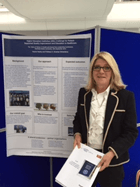Rachel Hawley recently attended ‘The Value of Values in Health and Social Care Leadership’ conference at the Centre for Leadership, Sheffield Hallam University on 18 September, on behalf of the Community and Health Research Unity. This inaugural event was a collaboration between the university and senior / Executive Alumni students who graduated from the MBA Medical and MSc Health and Social Care Leadership programmes including NHS England and local NHS Trusts.
At the event Rachel presented a poster presentation on the Higher Education Institution Challenge (HEI) Challenge for Patient Supported Quality Improvement and Education in Healthcare on behalf of the wider project team.
 The HEI Challenge Award 2014-15 is a unique opportunity for universities in the East Midlands and beyond, commissioned to deliver education by Health Education East Midlands, to foster sustainable approaches to working collaboratively across the region’s HEIs for the benefit of our population and to drive positive experiences and outcomes for learners and local employers. The ultimate goal of the HEI Challenge is to implement a cross-university collaboration to share, develop, showcase and spread work across East Midlands and surrounding universities around the unifying topic of healthcare quality improvement.
The HEI Challenge Award 2014-15 is a unique opportunity for universities in the East Midlands and beyond, commissioned to deliver education by Health Education East Midlands, to foster sustainable approaches to working collaboratively across the region’s HEIs for the benefit of our population and to drive positive experiences and outcomes for learners and local employers. The ultimate goal of the HEI Challenge is to implement a cross-university collaboration to share, develop, showcase and spread work across East Midlands and surrounding universities around the unifying topic of healthcare quality improvement.
For further information on the HEI Challenge click on the link.
Conference delegates were welcomed to the event by Professor Karen Bryan as Pro-Vice-Chancellor for the Faculty of Health and Wellbeing. The day began with a series of keynote presentations on a range of topics that addressed the value of values in health and social care leadership including:
Other keynote presentations included John Greatex sharing his experience of The Unipart way: efficiency with a human face and the paprelel lessons that can be learnt in health and social care. Sally Gretton from Skills for Care invited participants to consider putting ‘our values into action: considering the bigger picture’. Participants spent time networking around the poster presentations and engaging in a series of interactive workshops. For example Rachel White and George Rook on the value of patient and staff highlighting why stories matter, the key national drivers and examples of how stories are being used in practice to influence change and quality. An investment by NHS England into developing the processes and mechanisms to embed stories more systematically has led to the launce of a repository through which people can access / share stories as well as guidance and resources.
Rachel Hawley
